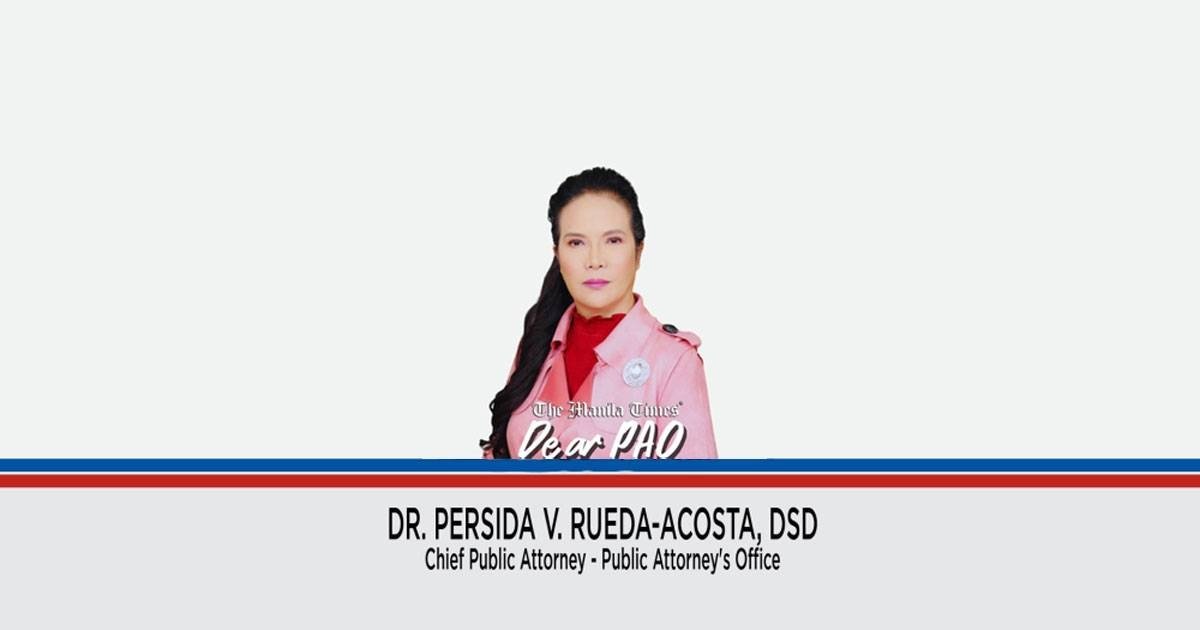Dear PAO,
My husband and I contracted a loan with a bank purposely to help finance our small merchandising store, which is on the verge of bankruptcy. As collateral, we mortgaged the land on which the store is located. In the succeeding years, we renewed our loan to increase the loan amount. However, the ready-made amended mortgage contract provides for a dragnet clause, which we later learned contains a provision stating that it secures payment of obligations already incurred or may be subsequently incurred. Due to dire financial constraints, I signed it. Is that valid?
Lina
Dear Lina,

Article 24 of the New Civil Code provides that “[in] all contractual, property or other relations, when one of the parties is at a disadvantage on account of his moral dependence, ignorance, indigence, mental weakness, tender age, or other handicap, the courts must be vigilant for his protection.”
Relatively, in Quiambao v. China Banking Corporation, GR 238462, May 12, 2021, penned by Associate Justice Mario Lopez:
“A contract of adhesion is a veritable trap for the weaker party whom the courts are bound to protect from abuse and imposition. Hence, in case of doubt, which will cause a great imbalance of rights, the contract shall be construed strictly against the party who prepared it. xxx
“In a contract of adhesion, one imposes a ready-made contract to the other whose sole participation is either to accept or reject the agreement. The parties do not bargain on equal footing in the execution of this kind of contract, given that the debtor is limited ‘to take it or leave it’ option, and there is no room for negotiation. However, such contract is not entirely prohibited. The one adhering is free to give his consent inasmuch as he is also free to reject it completely. Inarguably, the amendments to the REM are contracts of adhesion. xxx
“Moreover, it is undisputed that Elena only finished high school while Daniel reached only grade two. They cannot be expected to understand all the technicalities and foresee the legal implications of the transactions despite their business experience. Differently stated, Elena and Daniel lacked the adeptness to fully comprehend the effects of the amendments to the REM. On the other hand, China Banking Corporation merely concluded that Elena and Daniel freely, voluntarily, and willingly entered into the amendments to the REM but did not prove, let alone allege, that it made an effort to explain to them and ensure that they indeed understand the stipulations in the contract. Hence, there is reason for the court to step in and protect the interest of the weaker party, thus:
“The peculiar nature of such contracts behooves the Court to closely scrutinize the factual milieu to which the provisions are intended to apply. Thus, just as consistently and unhesitatingly, but without categorically invalidating such contracts, the Court has construed obscurities and ambiguities in the restrictive provisions of contracts of adhesion strictly, albeit not unreasonably, against the drafter thereof when justified in light of the operative facts and surrounding circumstances.”
Following the foregoing, it is clear that the amended mortgage contract which you signed is a contract of adhesion. It is not invalid per se. That contract is not entirely prohibited. Its validity, or invalidity, would be determined based on the peculiar circumstances of your case and your situation at the time of signing. When the court finds that you were put at a disadvantage on account of moral dependence, ignorance, indigence, mental weakness, tender age, and other handicaps, it may step in to protect your interests.
We hope that we were able to answer your queries.
This advice is based solely on the facts you have narrated and our appreciation of the same. Our opinion may vary when other facts are changed or elaborated on.
Editor’s note: Dear PAO is a daily column of the Public Attorney’s Office. Questions for Chief Acosta may be sent to [email protected]










